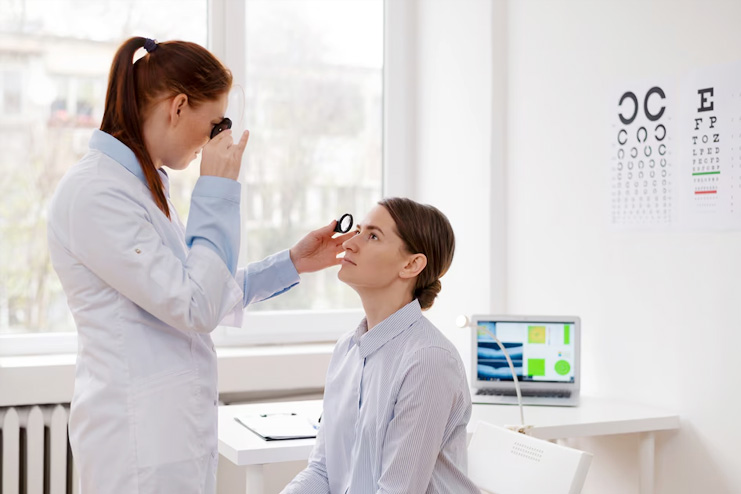Affiliate Disclaimer
Some links in this article are affiliate links. We may earn a small commission if you make a purchase through these links, at no extra cost to you. We only recommend products we find useful to our readersProactive health management is essential to holistic well-being since it helps identify and avoid any health problems at an early stage. The foundation of this strategy is regular screenings, which provide women with an active and empowered means of protecting their health. People can take control of their health and well-being by prioritizing preventive measures and making educated decisions about their care.
This article explores the importance of proactive health management and emphasizes how it contributes to preserving good health. It also reveals a carefully compiled list of recommended screenings that enable women to prevent health issues before they arise and offer a path to a better-informed and healthier way of living.
Screening #1: “Starting Strong – Gynecological Health Checks”

Beginning with fundamental gynecological screenings, particularly Pap screens and pelvic exams is the first step in ensuring women’s health and well-being. When it comes to early detection, these screenings are of the utmost importance since they enable medical professionals to discover any problems before they become more severe.
Pap smears can detect aberrant changes in cervical cells at an early stage. This allows for timely intervention, which is necessary to prevent cervical cancer. At the same time, pelvic exams are essential in determining whether or not there are any abnormalities in the reproductive organs. They help detect problems such as ovarian cysts or uterine fibroids earlier.
By making these gynecological health checks a priority, women adopt a preventative approach to preserving their reproductive health and significantly lower the risks connected with various illnesses. Early identification is a significant tool when it comes to preventing problems with reproductive health since it enables immediate medical intervention and facilitates the development of tailored treatment plans.
Related Article: 9 Natural Remedies For Chlamydia That One Should Try Out
Screening #2: “Heart Health Matters – Cardiovascular Screenings”

Addressing the heart’s health is paramount to pursuing total well-being; hence, customized cardiovascular examinations are necessary for women. These screens go beyond the evaluations since they consider the specific risk factors women may face. Through disseminating information regarding these specialized screenings, which include electrocardiograms (ECGs) and lipid profile tests, women are allowed to take a preventative approach to the early detection of potential cardiovascular disorders.
Cardiovascular screenings can provide personalized awareness of an individual’s risk factors, aid in preventing heart illnesses, and furnish this information.
Given that heart disease continues to be the top cause of death among women, these screenings serve as crucial tools in boosting awareness of heart health and motivating women to take responsibility for their cardiovascular well-being.
Next Article: 20 Best Foods to Eat During Periods and 11 Foods to Avoid
Screening #3: “Eyes on Tomorrow: The Visionary Health Screenings”

Maintaining optimum vision is essential to overall well-being, so routine eye health exams are integral to preventative healthcare. These screenings are not limited to correcting refractive errors; instead, they play an essential role in the early detection of eye diseases and ailments that can potentially impair vision. Comprehensive eye exams, which include evaluations for glaucoma, macular degeneration, and diabetic retinopathy, offer a holistic awareness of ocular health and make it possible to intervene promptly to maintain vision.
The significance of these screenings extends beyond the detection of vision disorders; they also serve as preventative measures against prospective complications that could affect day-to-day life. Furthermore, the adoption of straightforward routines might be beneficial to the long-term health of the eyes. It is crucial to protect one’s vision by avoiding exposure to damaging ultraviolet rays, consuming a diet that is well-balanced and abundant in nutrients that are beneficial to the eyes, and following healthy habits regarding electronic screens.
Next Article: 16 Useful Home Remedies For Urinary Tract Infection Treatment
Screening #4: “Balancing Act: Hormonal Health Screenings”

Navigating the complex web of hormonal health is necessary to achieve a state of overall well-being. Various screenings, such as thyroid tests and hormone level assessments, are vital in reaching this delicate balance. These screens investigate the complex dance hormones perform within the body, providing insights into potential imbalances that may impact various facets of health.
Thyroid screens, for example, offer a full assessment of thyroid function, which is essential for an individual’s metabolism, energy levels, and general vitality. In addition, hormone level measurements lead to a more sophisticated understanding of reproductive health, mood management, and bone density maintenance.
Hormones function as messengers, impacting various physiological processes. Hormone imbalances can result in a chain reaction of health problems, ranging from weariness and swings in weight to difficulties in reproduction. Participating in these screenings allows individuals to address hormonal disruptions earlier, paving the way for focused therapies and individualized health management.
Screening #5: “Silent Threats – STD Screenings”

Regular sexually transmitted disease (STD) screenings are a critical component of proactive health management, supporting early identification as well as prevention. Sexually transmitted diseases (STIs) can pose a threat to an individual’s physical and reproductive health, frequently acting invisibly. Frequent tests encourage a culture of accountability and transparency by empowering people to take charge of their sexual health.
When it comes to STDs, prevention and early detection are crucial. Screenings are essential for identifying and treating infections early because many have mild symptoms. Making STD screenings a standard component of medical care helps people improve their health as well as the health of the larger community by lowering the spread of infections.
It is also necessary to address prevalent misconceptions about STD screenings. Some people could withdraw out of dread of shame or criticism. It’s critical to debunk these myths and spread the word that STD testing is a standard, private part of medical care. People can approach these examinations fearlessly by promoting an open discourse, which guarantees a proactive and knowledgeable approach to sexual health that benefits both individuals and the community at large.
Screening #6: “Genetic Insight – Hereditary Health Risk Screenings”

Deciphering the secrets of our DNA offers priceless information about inherited health risks, which makes genetic tests an effective preventative measure. These tests provide a tailored examination of a person’s genetic composition, revealing potential family histories of particular illnesses. Knowing these genetic variables is incredibly empowering for women because it gives them the information they need to make decisions about their health.
Genetic testing has advantages that go beyond awareness. With this knowledge, people can reduce the effects of possible inherited health risks by taking preventative actions and participating in early interventions. Genetic testing enables women to actively shape their health, from issues impacting reproductive health to hereditary cancers.
Women can make more educated decisions and customized healthcare strategies by gaining a deeper understanding of their health story by emphasizing genetic insight. It is a step toward personalized medicine, in which timely interventions perfectly match each patient’s genetic profile. In the age of genomic medicine, accepting genetic health risk assessments is essential to building a future in which women are conscious of and actively involved in shaping their health outcomes.
Screening #7: “Mind Matters – Mental Health Screenings”

As the importance of holistic well-being becomes more widely recognized, mental health screenings become crucial for both individual health and the de-stigmatization of mental health services. Acknowledging the importance of mental health screenings is a critical first step in promoting an honest conversation about mental health. By integrating these assessments into standard medical care, we help dismantle obstacles and combat the stigma attached to mental health.
People must prioritize getting screened for mental health issues since doing so enables early diagnosis and intervention, which stops possible problems from getting worse. Through these exams, people can evaluate their emotional wellness, which promotes self-awareness and a proactive approach to mental health.
In addition, mental health exams support a comprehensive wellness strategy. Because physical and mental health are linked, treating one without the other may not be sufficient. By integrating mental health screenings into standard medical care, people take the first step towards achieving holistic well-being, highlighting the significance of mental health in reaching overall vitality and balance.
Next Article: 14 Possible “Cramps But No Period” Reasons You Didn’t Know About
Conclusion
The main lessons from the crucial health screenings offered here can be seen as a road map for empowered well-being in the larger picture of proactive health management. Screenings for gynecological and cardiovascular issues, as well as eyesight, hormonal, STD, and inherited health risks, are all essential components of preventive care.
Women can overcome potential health obstacles with resilience if encouraged to be alert, recognize health issues early, and adopt a proactive approach. As a final call to action, let’s value well-being and acknowledge the power of knowledge. Frequent screenings are acts of self-love that enable women to take control of their health narratives and set out on a path to a longer, happier life. They are more than just appointments.
References
- https://www.aurorahealthcare.org/services/womens-health/services-treatments/pap-smear-gynocologic-exam
- https://www.acog.org/womens-health/experts-and-stories/the-latest/why-annual-pap-smears-are-history-but-routine-ob-gyn-visits-are-not
- https://www.centrecardiolaval.com/en/2024/01/18/preventing-cardiovascular-disease-in-women-recognizing-the-signs-and-taking-action/
- https://www.prevention.com/health/a43554578/aha-heart-disease-risk-factors-screenings-women/
- https://www.ncbi.nlm.nih.gov/pmc/articles/PMC7349459/
- https://www.riverhilloptical.com/the-importance-of-yearly-eye-exams-a-comprehensive-guide/
- https://www.cdc.gov/visionhealth/resources/features/keep-eye-on-vision-health.html
- https://www.optometrists.org/general-practice-optometry/guide-to-eye-exams/why-are-annual-eye-exams-important/
- https://www.niddk.nih.gov/health-information/diagnostic-tests/thyroid
- https://www.healthline.com/health/thyroid-function-tests
- https://www.ncbi.nlm.nih.gov/books/NBK279414/
- https://www.ncbi.nlm.nih.gov/pmc/articles/PMC6866650/
- https://www.ncbi.nlm.nih.gov/pmc/articles/PMC6751565/
- https://www.cdc.gov/std/health-disparities/cars-toolkit-2020.pdf
- https://utswmed.org/cancer/support-services/education-resources/what-to-know-genetic-testing/
- https://medlineplus.gov/genetics/understanding/testing/benefits/
- https://www.cdc.gov/genomics/gtesting/genetic_testing.htm
- https://www.horizonblue.com/behavioralhealth/find-resources-get-support/taking-care-your-mental-health/importance-mental-health-screenings
- https://www.ncbi.nlm.nih.gov/pmc/articles/PMC5347358/















